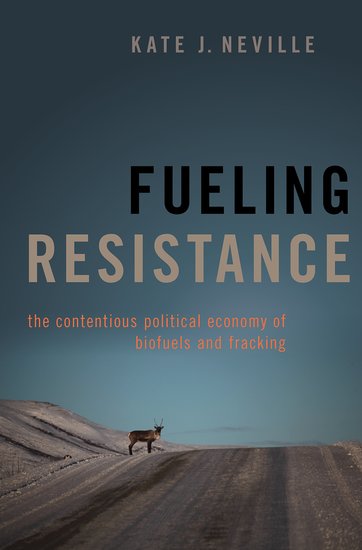What do the Yukon and Kenya have in common? A surprising amount when it comes to energy politics and the challenges surrounding the adoption of renewable or lower-carbon energy projects, claims Kate Neville.
Neville is an assistant professor, cross-appointed to the Faculty of Arts & Science’s Department of Political Science and the School of the Environment. Her research explores debates over resource governance and land use that emerge from new energy commodities and technologies.
She’s excited about the release of her first book, Fueling Resistance: The Contentious Political Economy of Biofuels and Fracking and will be taking part in a book launch event Feb. 26.
“It's thrilling and I'm hopeful this book will contribute to discussions that we need to have about the costs of all forms of energy,” says Neville.

Fueling Resistance examines proposals in East Africa for liquid biofuels (renewable energy sources derived from plants and plant oils) and in Northern Canada for fracking — a process by which water, sand and chemicals are injected underground at high pressures to crack open rock layers and release the oil or gas trapped inside.
They’re very different energy projects in very different places and yet the economics and politics of these projects have generated remarkably similar reactions and contentious responses from communities.
How did these vastly different regions come together in her book?
“My PhD research examined biofuels politics with a focus on Kenya and Tanzania,” says Neville. “Initially, I was going to turn that work into a book on how local community dynamics shape the uptake of biofuel projects. At the same time, I was starting new work on controversies over fracking in the Yukon as a postdoctoral fellow. And I thought that project was completely separate.
“But I started to wonder, why are debates over natural gas and oil so similar to debates over renewable energies like biofuels? Why are communities in Kenya and Tanzania responding to energy proposals in ways that look so similar to communities in the Yukon?”
That prompted Neville’s book, which uses debates over fracking and biofuels to further examine how global energy commodities are colliding with affected communities in terms of land use, food, climate change and social justice. She explains how certain characteristics of the projects led to specific strategies used by social movements.
In East Africa, biofuel projects seemed like they could be an ideal solution for energy needs — bringing economic opportunities, local fuels and carbon savings. But despite biofuel’s promised benefits, many communities were skeptical, demanding to know whose land was going to be used, who was running the project, and what, exactly, was the relationship between biofuel companies and the government.
You have to think about what water is being used, what land is being taken away from other uses and who has control over those decisions. All those things matter to whether or not these projects end up having positive ecological and social consequences or negative ones.
“Were the projects owned locally?” asks Neville. “Where were the biofuels going to be used? Was this going to benefit local communities, and did the people who use that land have any say in the project?”
Concerns with shifts in land use were central.
“You have to think about what water is being used, what land is being taken away from other uses and who has control over those decisions,” she says. “All those things matter to whether or not these projects end up having positive ecological and social consequences or negative ones.”
Thousands of kilometres away in the Yukon, concerns and criticism were raised over fracking, in part because of its connection to the continued use of fossil fuels.
“I was looking at how Yukoners were responding to this energy commodity that promised to be lower carbon than coal,” says Neville. But fracking raised concerns about climate change because it generates high levels of methane.
“Even if fracked oil and gas had some carbon benefits over coal, that still doesn't answer these same challenges. How do we think about whose waters are being used, whose lands are being rearranged, and who is gaining the benefits?
“Communities were saying, ‘Even if you could capture methane leakages and make this a lower carbon extracting process, we don't want to lock ourselves into a carbon intensive trajectory. And we don't want to further disturb fragile ecosystems.’”
And much like Kenya, communities in the Yukon needed clarity on exactly where the extracted oil and gas were going. Was it to supply northern communities with energy? Would this truly benefit northern communities?
In writing Fueling Resistance Neville was struck by how communities in both regions that don't usually have a lot of power in shaping energy and industrial development have rallied, stood their ground and raised resistance.
“The ways they use narratives around ownership, around belonging — these seemingly marginalized communities that you might not expect to have a lot of power sometimes end up having an influential voice,” says Neville.
Her work and book also reinforce the idea that all energy, whether renewable or non-renewable and regardless of region, comes with costs — environmental, economic and social.
“We have to carefully think about what the spillover effects might be,” says Neville.
“How do we create an energy future we're excited about, a socially just future that involves better access to energy, more careful use of energy and a real sense of what it costs to do the things we want to do?
It's a conversation I really want to participate in, contribute to and provoke further.”
Register for the Book Launch:
Register online for the virtual book launch of Fueling Resistance: The Contentious Political Economy of Biofuels and Fracking.
- Friday, February 26, 2021 — 3 - 4:30 pm
This online event is hosted by the School of the Environment.

